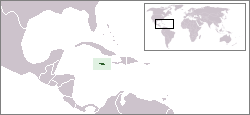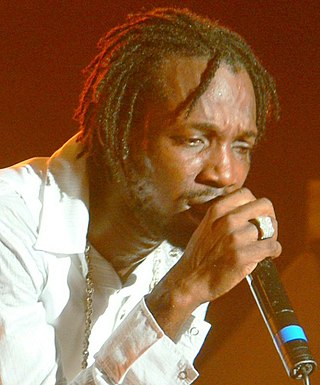Related Research Articles
The Eastern Caribbean dollar is the currency of all seven full members and one associate member of the Organisation of Eastern Caribbean States (OECS). The successor to the British West Indies dollar, it has existed since 1965, and it is normally abbreviated with the dollar sign $ or, alternatively, EC$ to distinguish it from other dollar-denominated currencies. The EC$ is subdivided into 100 cents. It has been pegged to the United States dollar since 7 July 1976, at the exchange rate of US$1 = EC$2.70.

Jankunu, also known as Junkanoo, is a festival that is celebrated as far back during slavery, and presently hosted as a street parade with music, dance, and costumes. Its origin, despite being claimed by several islands in the English speaking Caribbean, points strongly to Jamaica, and was later spread throughout the rest of the Caribbean. This period is as early as the 18th century, and possible earlier. Though stemming from the same origin, each celebration has been localized by different countries, and over time, evolved to be somewhat different. Jankunu is observed around Boxing Day, New Year's Day, and Easter holiday in some countries. These cultural parades are predominantly showcased in Jamaica, the Bahamas, and Belize where the music is also mainstreamed, and competition results are hotly contested. There are also Jankunu parades in Miami in June and Key West in October, where local black populations have their roots in the Caribbean. This tradition is one the oldest dance celebration in Jamaica. In addition to being a cultural dance for the Garifuna people, this type of dancing is also performed in the Bahamas on their independence day and other historical holidays. Historically, Junkanoo parades were also found in southeastern North Carolina that can be traced back to a Jamaican roots. However, the custom became less popular after slavery was abolished. The last known Jonkonnu celebration in the Southern United States was in Wilmington, North Carolina, in the late 1880s.
The British West Indies dollar (BWI$) was the currency of British Guiana and the Eastern Caribbean territories of the British West Indies from 1949 to 1965, when it was largely replaced by the East Caribbean dollar, and was one of the currencies used in Jamaica from 1954 to 1964. The monetary policy of the currency was overseen by the British Caribbean Currency Board (BCCB). It was the official currency used by the West Indies Federation The British West Indies dollar was never used in British Honduras, the Cayman Islands, the Turks and Caicos Islands, the Bahamas, or Bermuda.

Sandals Resorts is a Jamaican operator of all-inclusive resorts for couples in the Caribbean. It is a part of Sandals Resorts International (SRI), the parent company of Sandals Resorts, Beaches Resorts, Fowl Cay Resort, and several private villas. Founded by Jamaican-born entrepreneur Gordon "Butch" Stewart in 1981, SRI is based in Montego Bay, Jamaica and is responsible for resort development, service standards, training, and day-to-day operations. Sandals Resorts International has properties throughout the Caribbean islands of Jamaica, Bahamas, Saint Lucia, Antigua, Turks & Caicos, Grenada, Curacao, and St. Vincent with sixteen Sandals Resorts, three Beaches Resorts, one Fowl Cay private island resort, and four villa properties in Jamaica.

Millicent Dolly May Small CD was a Jamaican singer who is best known for her 1964 hit "My Boy Lollipop". The song reached number two in both the UK and US charts and sold over seven million copies worldwide. It was also the first major hit for Island Records and helped to achieve the label its mainstream success. She was the Caribbean's first international recording star, and its most successful female performer.
The Voice, founded in 1982, is a British national African-Caribbean newspaper operating in the United Kingdom. The paper is based in London and was published every Thursday until 2019 when it became monthly. It is available in a paper version by subscription and also online.

Lesbian, gay, bisexual, and transgender (LGBT) persons in Jamaica face legal and social issues not experienced by non-LGBT people. Consensual sexual intercourse between same-sex partners is legally punishable by imprisonment.
Stop Murder Music is a campaign to oppose Caribbean artists who produce music with lyrics alleged to glorify murder of homosexual men. The campaign was mainly against Jamaican musicians, primarily dancehall and reggae artists such as Buju Banton, Bounty Killer, and the Bobo Ashanti Rastafarians Sizzla and Capleton.

Caribbean Airlines Limited is the state-owned airline and flag carrier of Trinidad and Tobago, as well as Jamaica and Guyana. Headquartered in Iere House in Piarco, the airline operates flights to the Caribbean, North America and South America from its base at Piarco International Airport, Trinidad. Presently Caribbean Airlines employs more than 1,700 people and is the largest airline in the Caribbean. The company slogan is The Warmth of the Islands.
Richard Burnett, also known as Bugs Burnett, is a Canadian writer, editor, journalist, and columnist. He is known as an often controversial fixture of the Montreal media, with his writing sometimes attracting attention internationally. His column and blog, "Three Dollar Bill", dealt with pop culture, art, and gay life and culture across Canada and around the world. "Three Dollar Bill" was the first—and remains the only—syndicated LGBTQ+ column in Canadian publishing history, and it ran for 15 years.
Amy Ashwood Garvey was a Jamaican Pan-Africanist activist. She was a director of the Black Star Line Steamship Corporation, and along with her former husband Marcus Garvey she founded the Negro World newspaper.

David Constantine Brooks, better known by his stage name Mavado, is a Jamaican dancehall singer, who is signed to We the Best Music Group and formerly to Cash Money Records.

Una Maud Victoria Marson was a Jamaican feminist, activist and writer, producing poems, plays and radio programmes.
Prostitution in Jamaica is illegal but widely tolerated, especially in tourist areas. UNAIDS estimate there to be 18,696 prostitutes in the country.
Newspapers in the United States have traditionally endorsed candidates for party nomination prior to their final endorsements for president. Below is the list of endorsements in 2008, by candidate, for each primary race.

The Gleaner Company Ltd. is a newspaper publishing enterprise in Jamaica. Established in 1834 by Joshua and Jacob De Cordova, the company's primary product is The Gleaner, a morning broadsheet published six days each week. It also publishes a Sunday paper, the Sunday Gleaner, and an evening tabloid, The Star. Overseas weekly editions are published in Canada, the United Kingdom and the United States. The paper was known as The Daily Gleaner until 1992.

Leah Janine Marville is a Barbadian TV Host, model and beauty pageant titleholder who won Miss Barbados World 2009.

Maurice Tomlinson is a Jamaican lawyer, law professor, and gay rights activist currently living in Toronto, Ontario, Canada. He has been a leading gay rights and HIV activist in the Caribbean for over 20 years and is one of the only Jamaican advocates to challenge the country's 1864 British colonially-imposed anti gay Sodomy Law. This law predominantly affects men who have sex with men (MSM) and carries a possible jail sentence of up to ten years imprisonment with hard labour.
Faithful Word Baptist Church is a New Independent Fundamentalist Baptist church in Tempe, Arizona, that was founded by Steven Anderson. The church describes itself as "an old-fashioned, independent, fundamental, King James Bible-only, soul-winning Baptist church." Members of the church meet in an office space that is located inside a strip mall. Anderson established the church in December 2005 and remains its pastor.

Eric Anthony Abrahams was a Jamaican public servant and broadcaster. He was director of tourism from 1970 to 1975, and minister of tourism and information from 1980 to 1984. After leaving office, he co-created a radio show with Beverley Manley, "The Breakfast Club". He was involved in a libel suit against the Gleaner Company, which initially resulted in a major settlement to him. Abrahams was educated at Jamaica College and later at the University of the West Indies and University of Oxford. At Oxford, he was elected president of the Oxford Union, a debating society. In 1964, he hosted a debate attended by Malcolm X. In Britain, he briefly worked for the BBC as its first black TV reporter.
References
- ↑ "The expanding "Jamaicanization" of Jamaica's industrial and commercial concerns was the theme for an Editorial which appeared recently in the Jamaica STAR NEWSPAPER. The Editorial captioned "A HEALTHY SIGN", had this to say:…" Messam, LeRoy A. (October 2, 1965). "WEST INDIES DIARY". Bay State Banner. Boston.
- ↑ "Miss Jamaica loses her crown". UPI. March 16, 2007.
- ↑ Star reporting is cited for a local angle on a U.S. story. "Judge rejects life sentence without parole for Jamaican 'D.C. sniper'". Caribbean Today. Miami. June 1, 2017.
- ↑ Cites Jamaica Star reporting in lead paragraph: Humm, Andy (March 20, 2009). "Two Arrested in Murder of Gay Man in Jamaica Newspaper". Gay City News. New York.
- ↑ Cited as "a local tabloid"."Attacks Show Easygoing Jamaica Is Dire Place for Gays". New York Times. February 24, 2008.
- ↑ Cited in music article.Abebe, Nitsuh; SHEPHERD, JULIANNE ESCOBEDO (March 13, 2016). "THE MUSIC ISSUE: 25 SONGS THAT TELL US WHERE MUSIC IS GOING / 'El Taxi' by Pitbull: 'Mr. Worldwide' speaks in pan-Caribbean code". The New York Times Magazine.
- ↑ "'I don't know him (West) as a Christian and someone who is being led by the Holy Spirit,' local pastor Stephen Blake told the Jamaica Star. 'We have to examine the motive here.'" "Kanye West's plan to hold Sunday Service in Jamaica angers local pastors". Music-News.com. Retrieved 2021-01-29.. Also here. The original story is on the subscription-only NewsBank.com, and is picked up by numerous other websites.
- ↑ "He tells The Jamaica Star newspaper…""DRAKE DONATES TO JAMAICAN LEARNING CENTRE". World Entertainment News Network. England. July 14, 2010.
- ↑ New Hampshire Union Leader, picks up Washington Post article, citing a statement to the Jamaica Star. Bever, Lindsey (February 12, 2019). "A lottery winner showed up in a 'Scream' mask to claim his million-dollar prize". The Washington Post.
- ↑ "Lottery winner showed up in 'Scream' mask to claim his million-dollar prize". New Hampshire Union Leader. February 14, 2019.
- ↑ "Explaining his reasons for recording the song, Zagga told the Jamaica Star:…"Gayle, Damien (2020-03-18). "Countries urge citizens to return home and long trials put on hold in UK over Covid-19 – as it happened". The Guardian. ISSN 0261-3077 . Retrieved 2021-01-29.
- ↑ "…check the Daily Gleaner, the Jamaica Observer and the Jamaica Star for the low-down on who's playing when and where – but wherever you go, there is music to be found."Holland, Kaye (February 13, 2020). "Where to drink in Jamaica, from laid-back beach bars to all-night dub parties". The Daily Telegraph. London.
- ↑ "Editor and Publisher 1965-04-17: Vol 98 Iss 16"